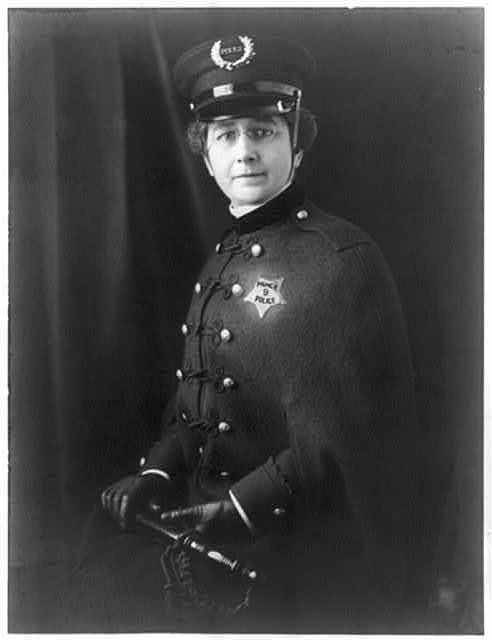MUNCIE'S FIRST WOMAN POLICE OFFICER

Alfaretta Martha Poorman was born in St. Clairsville, Ohio, the daughter of Col. Christian Longstreet Poorman and his wife on December 17, 1860. She married Thomas Francis Hart on July 9, 1883
in Bellaire, Ohio. The couple had four children, two dying during childhood, and two living to adulthood. None would outlive Thomas and Alfaretta. Thomas F Jr. born February 13, 1893, and died
July 28 of that year. Son Christian died sometime prior to 1900, but his details are unknown. Daughter Bertha Elizabeth died in childbirth in Bronx, New York, in 1903. Son Laurence died in 1929.
Thomas had been heavily involved in glass manufacturing in Leesdale, Schuylkill County, Pennsylvania, with Joel and George Maring. The group moved to Indiana in about 1888 to make the most of what the local gas boom had to offer. They built a factory in Dunkirk for making glass containers. It was quickly followed by a second site in the Muncie ‘suburb’ of Boyceton built for the manufacture of window glass.
In 1908, Thomas with other local industrialists, started the Interstate Automobile Company.
Money likely flowed steadily into the household allowing Alfaretta to focus on social activities and she was a regular face in prominent circles. Following a family pattern of writing, she wrote a book about her international travels that was republished as a serial in the local Parish Monthly. Eventually, boredom or a greater calling pulled her out of the house and into an unusual role. In January, 1914, Mrs. Hart was appointed as the first matron of the Muncie police department by Mayor Rollin H. Bunch. It was her hope to bring light to social issues such as prostitution and juvenile crime. While hers was a paid position, the socialite donated her pay to the women she wanted to help.
Her uniform was of her own design. It was navy blue and hand tailored, and consisted of a walking length skirt, Norfolk jacket trimmed in red braid with brass buttons, a white shirt waist with a Roman collar, a cassimere cape trimmed in black and brass with a black velvet collar, and a matching cap with a patent leather visor. She carried a dark cherry patrolman’s club with red tassels. A five pointed silver star with the number 9 was worn on the left breast. She spoke of her outfit in an interview. “I adopted a uniform for my own protection, as my work takes me into public places, and many strange ones, and if I were dressed in citizen’s dress I would have to be continually explaining who I am.”
Her greatest battle was against the hypocrisy that was present in Muncie society. She is quoted as saying “I have far more respect for the lowest drunkard than I have for the church-going hypocrite who scorns the drunkard but who is himself seducing his neighbor’s wife or daughter.” Indicating how widespread the issue was, she proclaimed “There will be more hypocrites in h--- than prostitutes and saloon keepers.”
There are no statistics to speak for her success or failure of bringing about change. Her career and ‘Muncie’s Millionaire Police Woman’ were cut short. She resigned after only eleven months on the job. With her in-your-face approach to making public statements, it is unclear whether her ‘health’ had been threatened external or internal factors remains unclear, but she turned in her badge and club in December.
In 1920, Alfaretta and Thomas moved in Dallas, Texas, to join son Lawrence. “L. A.” as he was known, who had moved south four years earlier to serve as president of a furniture manufacturing company that Thomas had purchased. Eventually, Thomas would purchase a paper company where she would serve as vice president of it as well as president of the Chicago Oil Company. Thomas passed away there on July 6, 1934, and Alfaretta succeeded him as the as the president of the Home Furniture Co. and T. F. Hart Investment Co. She also wrote articles for a Dallas newspaper under the pen name “Martha”.
Alfaretta Martha (Poorman) Hart passed away in Dallas on January 16, 1951. Her body was returned to Muncie, and following the services at St. Lawrence Catholic Church conducted by Msgr. Felix Seroczynsky, She was laid to rest on a sunny hill in Beech Grove Cemetery. She was preceded in death by her husband, her three sons and her daughter, and survived by a grandson, two nieces and a nephew.
© On The Banks Of White River/Jennifer Lewis 2016, 2020
[An earlier version of this article appeared in the Delaware County (Indiana) Historical Society Newsletter, May/June, 2016]


